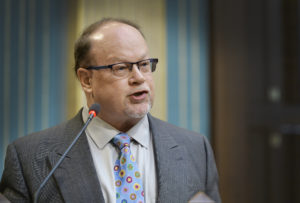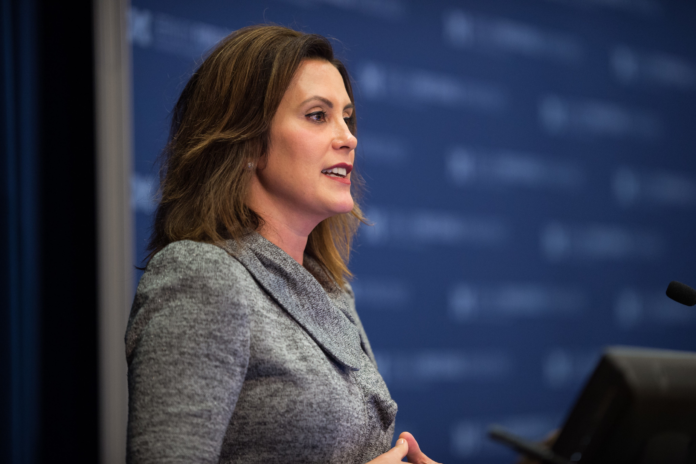The Minnesota DFL is scheduled to host Michigan Gov. Gretchen Whitmer for its annual “Founders Day Dinner” next week, even though the first-term executive is facing intense scrutiny over her COVID-19 policies for nursing homes.
“Since COVID-19 hit, Gov. Whitmer has faced down far-right, anti-government extremists in order to take the necessary steps to protect the health and safety of the people of Michigan,” DFL Chairman Ken Martin said in a March press release.
He then praised Whitmer’s “courage, leadership, and determination to do what’s right,” calling her actions an “inspiration in these trying times.”

The lifelong Michigander is scheduled to keynote the DFL’s virtual Founders Day celebration April 15. A website created for that event describes the former state lawmaker as a leader with “gut, grit, and grace” who took “bold action to protect the people of Michigan from the spread of COVID-19.”
Some of those bold actions included an April 15, 2020, executive order prohibiting nursing homes from denying readmission (in most cases) to residents who were hospitalized with COVID-19.
Republican lawmakers have since requested both state and federal investigations into whether Whitmer’s order “exacerbated the death toll” in long-term care facilities. They have also accused the Whitmer administration of failing to resolve “reporting errors” in the state’s official COVID-19 database.
“Gov. Whitmer’s regional hub policy placed patients with and without COVID-19 in the same facilities and may have exacerbated the death toll in those facilities,” eight GOP legislators said in a February letter to Michigan Attorney General Dana Nessel.
“Executive Order 50 of 2020 required long-term care facilities with dedicated units to accept admission of residents who had tested positive for the virus regardless of whether those residents may have still been contagious. However, due to reporting failures, there will be no accurate data on how many residents may have been harmed by this policy because there is no clear reporting path to document nursing home patient cases by facility after a transfer takes place,” the letter continued.
According to the letter, nursing home residents were moved freely between long-term care facilities and hospitals, which “may have significantly increased exposure of nursing home residents to the virus while simultaneously shielding the death toll.”
New York Gov. Andrew Cuomo has faced calls for his resignation after it was revealed that his administration intentionally counted only residents who died inside a nursing home in the state’s official tally, excluding those who died after being moved to a hospital.
Attorney General Nessel rebuffed the request for an investigation last month, saying it would be an “abuse” of the “investigatory powers of this department.”
In response, state Sen. Jim Runestad introduced legislation that would fund a special investigator to look into Whitmer’s nursing home policies.
“In New York, their attorney general did the right thing and found the truth. That’s what we need to happen for the families here in Michigan,” Runestad said in a press release.

“If our attorney general refuses to do the right thing and investigate, then someone else is going to have to do it,” he added. “Inaction and protecting political allies are apparently more important to our attorney general than standing up for the victims and their families.”
The Michigan Senate also adopted Runestad’s resolution to encourage county prosecutors to pursue their own investigations.
“We encourage county prosecutors to fill the gap left by the attorney general and pursue appropriate and reasonable investigations into the governor’s nursing home policy and the reported data on deaths in nursing homes,” that resolution states.
State lawmakers have also requested more information on the U.S. Department of Justice’s August announcement that it was seeking data from Whitmer and three other governors who issued similar nursing home orders, including Cuomo.
Whitmer is facing additional criticism over a $155,000 payout that her former health department director, Robert Gordon, received after his “abrupt, unexplained departure” in January.
“Gordon issued many health directives after a Michigan Supreme Court decision limited Gov. Whitmer’s ability to extend emergency declarations. These directives impacted lives and livelihoods throughout the state, including those in nursing homes,” Republicans said in one of their letters.
Runestad and his Republican colleagues are far from the only Whitmer critics. With the help of the Mackinac Center for Public Policy, Pulitzer-Prize winning journalist Charlie LeDuff sued the state for access to information about nursing home deaths, which the state “is hiding from the public.”
“Michigan citizens deserve to know if Gov. Whitmer, like Gov. Cuomo, has hidden the true number of deaths resulting from her dangerous decision,” LeDuff said in an op-ed for USA Today.
The veteran journalist said the state continues to release information about the number of cases and deaths “but not the underlying records.”
“This is unacceptable. The state is asking voters to simply accept its published data, without the chance to verify the records used to create them. The Cuomo scandal demonstrates how dangerous it is to simply trust politicians. Access to information is essential to accountability,” he continued.
As LeDuff mentioned, Gov. Cuomo is under investigation for deliberately undercounting the COVID-19 death toll in New York’s nursing homes.

















